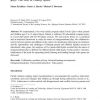Free Online Productivity Tools
i2Speak
i2Symbol
i2OCR
iTex2Img
iWeb2Print
iWeb2Shot
i2Type
iPdf2Split
iPdf2Merge
i2Bopomofo
i2Arabic
i2Style
i2Image
i2PDF
iLatex2Rtf
Sci2ools
CSCL
2010
2010
Using activity theory to understand intergenerational play: The case of Family Quest
We implemented a five-week family program called Family Quest where parents and children ages 9 to 13 played Quest Atlantis, a multiuser 3D educational computer game, at a local after-school club for 90-minute sessions. We used activity theory as a conceptual and an analytical framework to study the nature of intergenerational play, the collaborative activity between parents and children in the context of role-playing virtual game environment, and the opportunities and challenges of bringing parents and children together around an educational video game. Our analyses of five parent-child dyads revealed that the nature of intergenerational play is different for different parent-child dyads, but has positive outcomes. Implications of the study for supporting family learning and bonding through video games are discussed. Keywords Collaborative problem solving . Informal learning environments . Intergenerational play. Parent-child interaction . Video games
| Added | 14 May 2011 |
| Updated | 14 May 2011 |
| Type | Journal |
| Year | 2010 |
| Where | CSCL |
| Authors | Sinem Siyahhan, Sasha A. Barab, Michael P. Downton |
Comments (0)

